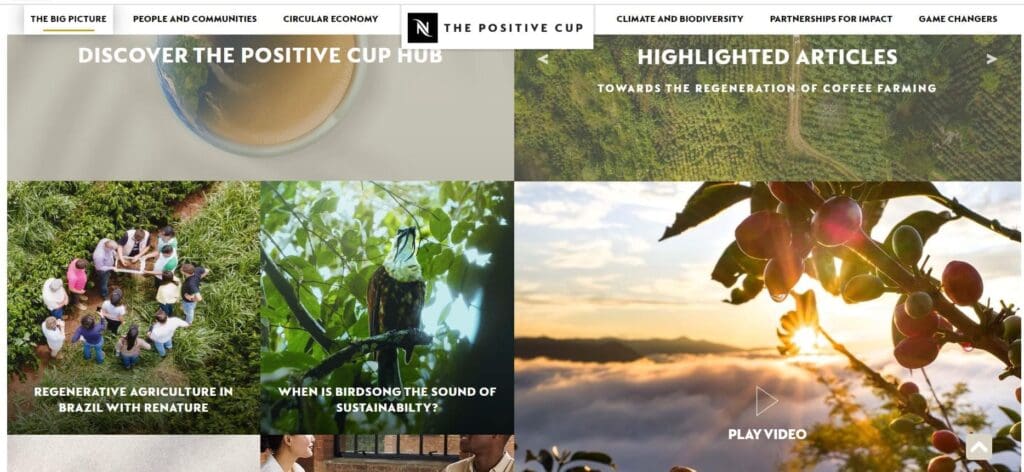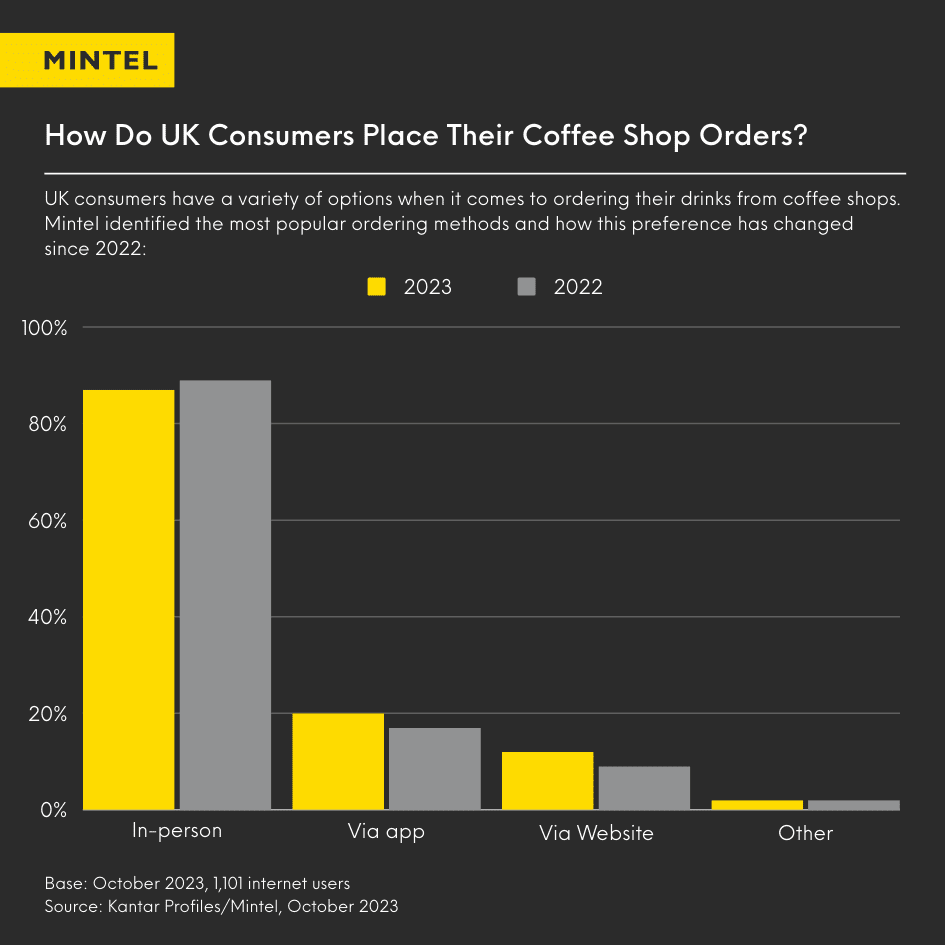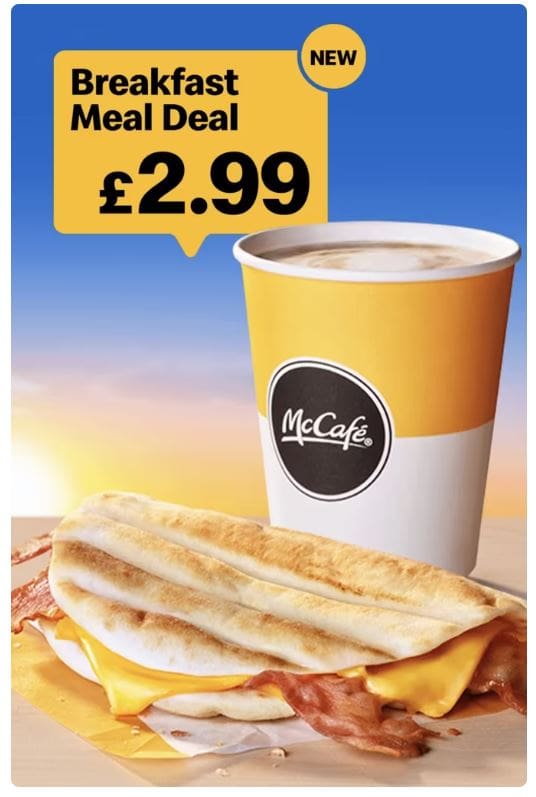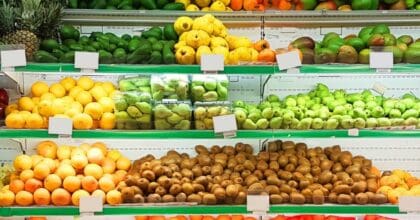In times of inflationary pressure, consumers’ might turn their backs on coffee shops and opt for both value and premium formats. A rise in usage of instant coffee and mixes provide money-saving value options for consumers, but are posing a threat to coffee shops, as people visit them less often to save money.
How can coffee brands tap into arising opportunities resulting from this consumer behaviour and what can coffee shops do to remain relevant? Mintel’s research on coffee marketing reveals that, ultimately, taste and indulgent claims help unlock consumer spending.
How is the Coffee Market Changing?
With rising inflation and strained budgets, people are looking to get the coffee shop experience at home with value formats and certain blends that replicate barista coffee. Instant coffee and mixes are the perfect answer for coffee lovers on a bargain hunt with instant coffee dominating the UK coffee market. In the short term, continuing pressures on household incomes hold further potential for lower cost formats, and brands can tap into the disruptions to shoppers’ habits. Especially younger consumer groups can be engaged through coffee shop style drinks at home.
While this is good news for coffee brands, this raises red flags for coffee shops. The coffee shop industry has already undergone immense pressure during the pandemic while it was subjected to constant closures. Now, coffee shops are, again, feeling the heat of the cost of living crisis, while also being threatened by non-specialists, as 53% of German consumers buy drinks from bakeries and in-store outlets rather than coffee shops.
To appeal to their customers during an economic downturn, coffee shops must emphasise their unique attributes, such as barista-made drinks, the social and indulgence aspects associated with enjoying a cup of coffee at a café while reading a book, or chatting with friends. Selling the experience of drinking coffee at a coffee shop as hard or even impossible to replicate at home, is what makes them stand apart from coffee brands, selling their barista and coffee shop inspired blends.
Coffee Market Trends – Look Familiar?
Coffee consumer trends show that, while brand familiarity was a strong purchase driver in 2023, promising quality, the continued income squeeze has prompted widespread trading down with low brand loyalty in a competitive and fragmented market – 47% of UK consumers now prioritise price over brand when choosing a coffee shop.
Premium brands have been hit hard; although Nescafé retains its lead in the instant coffee segment, the market leader was not immune to trading down. Meanwhile private labels stand out as the star performer in the category, gaining five percentage points of market share since 2022.
The Caffeine Reduction Trend
What is the trend in coffee in the UK? An increased awareness of health, including concerns over the impact of caffeine on sleep and mood causes a substantial threat to coffee shops and the coffee market. The caffeine reduction trend causes 2 in 5 UK consumers to cut down their caffeine intake.
On the bright side, most coffee drinkers prefer to cut down on their coffee intake rather than switch to decaffeinated options, as decaf options fail to win over most concerned consumers. However, 53% of UK coffee drinkers show interest in information about caffeine levels and products offering varied levels of it. Only a few UK coffee brands call out their caffeine level, and if they do, the focus is largely on high caffeine levels. Lower caffeine variants should communicate their suitability for afternoon and evening occasions, which could help engage younger groups, as they are more concerned about the impact of caffeine on their sleep compared to older groups.
Why People Will Remain Both the Ultimate Challenge and Answer for Sustainable Coffee
The pressure on household incomes has seen green issues take a backseat, but Mintel predicts a longer-term uplift in interest. Although sustainability concerns are gaining traction, and environmental initiatives draw consumer interest, the majority of coffee drinkers are not willing to try lab-grown coffee.
The main purchase drivers for coffee remain taste and indulgence. Therefore, it is not surprising that consumers hold reservations towards sustainable coffee innovation, such as lab-grown coffee. The goal for coffee brands is to combine both taste and indulgence with sustainable practices. Investments in solutions that benefit the Earth and consumers alike, e.g. climate resilient beans, will be key in aligning consumer demand with planetary health. For example, Nescafé, who are considered a trusted brand by consumers, have dedicated an entire part of their website to sustainable coffee, communicating to their consumers what sustainable sourcing means and how their coffee is farmed.

Nescafé dedicates part of their website to communicate the farming and production of their coffee transparently. Source: sustainability.nespresso.com
Why reusable cups provide opportunities for sustainability without compromising on taste: Despite consumer awareness around plastic pollution, convenience is still at the top of people’s minds, thus maintaining the popularity of takeaway coffee. Bring-your-own-cup schemes are not gaining enough traction, as always having your own cup on hand is not viewed as convenient.
The German government introduced a Reusable Packaging Law, which obliges venues selling takeaway food and drinks to offer their products in reusable containers as an alternative to disposables. Yet, 40% of Germans who buy drinks-to-go from coffee shops do not typically opt for reusable cups, leaving scope for coffee shops to do more to encourage sustainable behaviours and cut waste. Coffee shop operators can improve visibility of reusable options and how to return them, for example, by incorporating reusables into sales processes via prompts at point of purchase such as making reusables the default option.
How are Customers Buying, Ordering, and Consuming Coffee?
Sitting In vs. Taking Away
After years of on and off coffee shop closures due to the pandemic, in-store participation is back on track as social coffee drinking occasions outside the home are picking up again along with spontaneous stops at coffee shops on the way to work.
Despite having access to a greater range of takeaway options, the latest coffee consumption trends suggest that in-store purchases remain the most popular and preferred coffee drinking method in the UK at 83%. A driver for the strong return to in-person ordering, is the fact that most coffee shop visits happen spontaneously, and are usually not an activity planned for in advance. Moreover, brick-and-mortar coffee shops offer a greater variety of choice when it comes to different coffee formats and types.
Coffee Shop Market Trends: Ordering Coffee Using Apps
At 87% in-person ordering continues to be the preferred method. 20% however use coffee shop apps to place their orders. Alternative order methods are particularly gaining traction among younger consumers. Operators, especially chains, are fuelling this coffee shop trend by seamlessly integrating online and in-store experiences. For example, Costa Coffee encourages app usage by showing how easy it is for users to locate nearby outlets, pre-order drinks, and earn loyalty points by using the app.

How is the Revenue of the Coffee Shop Industry Being Impacted by Recent Behaviour and Purchase Trends?
The current economic climate and consumers’ financial situation influences coffee trends and usage. Usage of ground coffee and coffee pods, particularly, has dropped among those who are financially struggling, echoing the higher price of these products while demonstrating that coffee shops risk losing customers during the cost of living crisis.
Nevertheless, increased engagement with coffee mixes and RTD coffee show that 37% of UK consumers still need their daily dose of energy in the form of caffeine, but are seeking it at a lower price point. The rise in usage of coffee mixes as well as the increased engagement with RTD coffee is driving booming sales in this segment, creating more competition in the coffee (shop) market.
This rise in mixes and RTD coffee threatens coffee shop industry growth, and operators will have to redefine their value for money and defend their position and products, by emphasising the coffee shop experience of coffee consumption.
How is the Coffee Market Changing? 2024 Trends in Coffee and How Your Business Can Tap into Them
1. Compete with non-specialists and cheaper alternatives.
Private label’s newly competitive quality perceptions are setting the standard during the cost-of-living crisis, and brands will have to follow their lead. Although coffee shops remain popular, they also face competition from cheaper, non-specialist alternatives, such as retail cafés.

For instance, McDonald’s McCafé, offers a free hot drink with the purchase of a breakfast through its app-exclusive deals. Source: McDonald’s UK
Similarly, coffee shops see themselves threatened by cheaper at-home coffee options that promise a barista coffee experience. To remain relevant in a highly competitive landscape, operators can offer tiered pricing models, ranging from standard to premium blends.
2. Position your brand to appeal to health conscious consumers.
The excessive sugar content in sweet food and drinks served at coffee shops poses a significant health risk to consumers. Some popular cafés and coffee shops are offering products containing up to five times the recommended daily sugar limit of 30g set by NHS guidelines. This has prompted health watchdogs to advocate for more transparent labelling regarding sugar content, empowering consumers to make informed decisions about their purchases.
Consumers are also worried about the effects of caffeine on their health. To appeal to those seeking to reduce their caffeine intake, brands and operators should communicate the contents of their drinks more transparently, while also offering options that feel personalised to consumers’ desired ‘buzz’.
3. Support social enterprises.
More than half of consumers agree that social enterprise coffee shops help to create a stronger sense of community. Operators have an opportunity to capitalise on people’s desire to support brands that advocate for social causes while also empowering underrepresented consumer groups.
Despite the desire to support a good cause with their purchase, consumers remain cautious when it comes to sustainable coffee innovations. To foster growth, beanless brands will have to communicate taste over sustainability, as taste and indulgence remain the most prominent purchase factors for 62% of coffee drinkers in the UK.
4. Provide amenities for furry customers.
With 50% of consumers finding dog-friendly venues appealing, this trend highlights the growing demand for pet-inclusive spaces that cater to the needs of both humans and their furry companions.
To find out more about how you can strengthen your brand value and ensure your business’ growth in the coffee shop industry, read on in our UK Cafés and Coffee Shops Market Report 2023, or explore our wide range of coffee industry related market research.










































